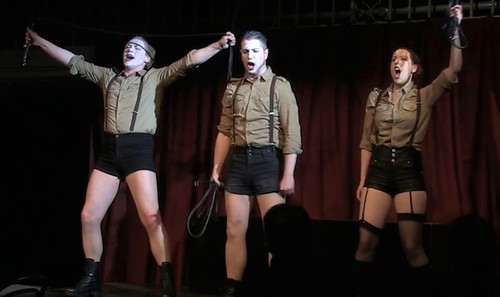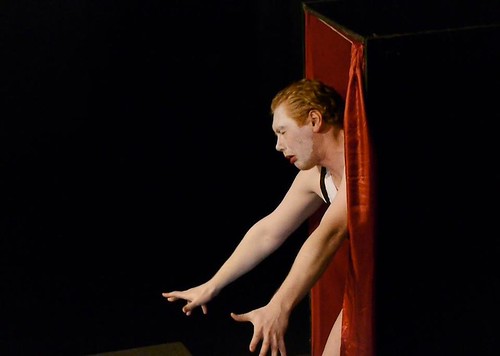Review – 1933: Eine Nacht Im Kabarett
✭✭✩✩✩ Musically sound
Summerhall
Wed 22 Jan – Sun 2 Feb
Review by Thom Dibdin
Dress up, take part and join in at Anke’s, the Berlin night-club created in Summerhall, for this politically-charged production set on 30 January 1933, the night Hitler became Chancellor of Germany.
This is full-on immersive theatre from writer/director Susanna Mulvihill, working with Jen McGregor of Tightlaced Theatre, who have done enough to suggest that Summerhall’s Dissection Room is a seedy, disreputable Berlin nightspot – despite the high ceiling, bright lighting and less-than-intimate feel to the venue.
The conceit is that while Anke’s compere, Simone (Bev Wright), conducts her audience through the cabaret evening, her between-act banter with her audience in general – and a couple of the guests in particular whose private conversations are audible to the whole audience – creates a piece of theatre which somehow comments on contemporary political life.
The difficulty for the theatricality of this ambitious show is that only one element of it truly convinces. Fortunately for the immersive side of things, that element is the music. All original and credited – with lyrics – to Mulvihill, Wright and Fiona Thom (who is AD on the production).
The incidental performances from house band Les Chiens, that is Michael Wiedenhof on double bass and Mulvihill on piano, keeps the atmosphere right on the button.
Further in the limelight, the on-stage numbers have a real 1930s German feel to them. Particularly when house performers the Ratlings – David MacFarlane and Calum MacAskill – are joined by Hazel DuBourdieu who plays Marieke, the bar owner Anke’s daughter and wannabe cabaret star.
There is a great contrast between the boys’ tough-love attitude to tonality with DuBourdieu’s very classy voice. It is a contrast which speaks of quickly honed sketches and an authentically brusque attitude to the performance which chimes perfectly with the concept of a scuzzy, underground dive.
Less compelling – and sadly so – is Wright. Her delivery just does not have that intimacy and warmth between stage and audience which an on-the-ball compere can generate. There are moments where she succeeds in bringing the whole room together, but overall her delivery is slow and flat when it needs to be a lot slicker and more engaging to do justice to her material.
A succession of strongly anti-establishment numbers
And there is plenty there to do justice to, with a succession of strongly anti-establishment numbers. On this night, in this town, that can only mean anti-Nazi Party. Numbers such as Brown Shirts, mocking Hitler’s thugs, and an audience sing-along number The Beer Hall Lieder are obvious.
Down and Out in Austria, a kind of silent movie sketch, casts Hitler in a pastiche of Orwell’s Down and Out in Paris and London (which had only just been published at the time the whole piece is set).
The night’s finale, Mein Kampfe, sees Wright step up to perform a number herself and questions quite what, exactly, Hitler’s struggle was really about.
If this on-stage activity is good but underachieving – the one “real” performance of the evening from burlesque artiste Gilda Lilly just shows how far off the mark they are – the immersive performance side of the production simply hits fail after fail.
The problem is that it is often inaudible if you are not sitting next to the performers. Or if you can make out the words, you are straining so hard to hear them that you can’t really understand what is being said.
Danielle Farrow as Anke, hustling around to keep her bar going and arguing with Marieke to get off the stage and serve at tables, is reasonably well created and audible.
Not so Robert Howat, as an unconvincing American journalist, and Kirsty Eila McIntyre as his companion for the evening, Birgit the daughter of a socialist university lecturer.
The arrival of Anke’s son Dieter (William Mitchell) who has joined the Nazis, with his friend Captain Voehner (Andy Corelli), ups the temperature a bit in the second half. Corelli is quite the part, stalking round the audience and engaging with them in a laconic but unsettlingly intimidating manner.
Yet if this is unsettling in a positive way for the feel of the production, it doesn’t always work with the comprehension of what is going on.
Indeed, the whole immersive nature of the production needs to be rethought. It is partly about design – creating an environment in which the performers can be heard by all their audience. It is telling to note that the production gives no credit for a designer.
Overall, this is a strong and ambitious idea which fails to meet its ambitions largely because of its presentation. The cabaret side is fun, however. It will no doubt become increasingly slick over the run, and is worth dressing the part to enjoy.
If, as political theatre, the production never gets beyond the message that Nazis and racists are no fun, it is a message which bears much repetition.
Running time 2 hrs 15 mins.
Run ends Sunday 2 February 2014
Daily at 7.30pm
Dissection Room, Summerhall, 1 Summerhall EH9 1PL
Details and tickets at www.summerhall.co.uk
Company details at: 1933kabarett.com
ENDS



















